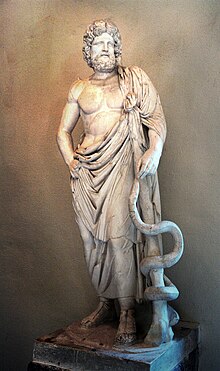Esculapius
| Asclepius | |
|---|---|
| God of medicine, healing, rejuvenation and physicians | |

Asclepius with his serpent-entwined staff, Archaeological Museum of Epidaurus
|
|
| Symbol | Serpent-entwined staff |
| Consort | Epione |
| Parents | Apollo and Coronis |
| Siblings | Step-siblings of Asclepius |
| Children | Hygeia, Iaso, Aceso, Aglaea, Panacea, Machaon, Podalirius, Telesphoros, Aratus |
| Roman equivalent | Vejovis |
Not to be confused with Asclepias
Asclepius (/æsˈkliːpiəs/; Greek: Ἀσκληπιός, Asklēpiós [asklɛːpiós]; Latin: Aesculapius) was a hero and god of medicine in ancient Greek religion and mythology. Asclepius represents the healing aspect of the medical arts; his daughters are Hygieia ("Hygiene", the goddess/personification of health, cleanliness, and sanitation), Iaso (the goddess of recuperation from illness), Aceso (the goddess of the healing process), Aglæa/Ægle (the goddess of beauty, splendor, glory, magnificence, and adornment), and Panacea (the goddess of universal remedy). He was associated with the Roman/Etruscan god Vediovis and the Egyptian Imhotep. He was one of Apollo's sons, sharing with Apollo the epithet Paean ("the Healer"). The rod of Asclepius, a snake-entwined staff, remains a symbol of medicine today. Those physicians and attendants who served this god were known as the Therapeutae of Asclepius.
...
Wikipedia
